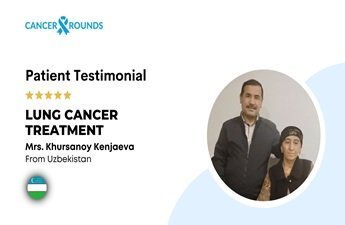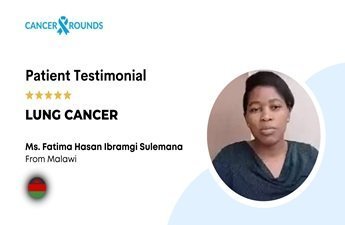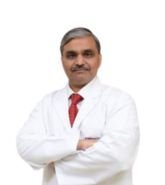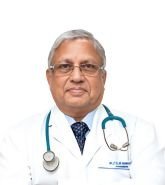Lung Cancer Treatment in Germany
Lung cancer is among the most common and deadliest cancers worldwide, and Germany is no exception. According to the German Cancer Registry (Krebsdaten) and the Global Cancer Observatory, lung cancer continues to represent a significant proportion of new cancer diagnoses as well as cancer-related deaths each year. One of the biggest challenges is that lung cancer is often detected at a late stage, when treatment options are more complex and outcomes less favorable.
Despite this, Germany has emerged as a global leader in lung cancer diagnosis and treatment, offering patients access to early detection programs, precision oncology, cutting-edge therapies, and advanced clinical trials. With world-class hospitals, internationally recognized cancer specialists, and innovative approaches such as immunotherapy, targeted therapy, and personalized medicine, Germany provides hope and improved survival prospects for patients battling lung cancer.
Incidence & Mortality of Lung Cancer in Germany
Lung Cancer Statistics in Germany
According to the German Centre for Cancer Registry Data (Robert Koch Institute – Krebsdaten), lung cancer remains one of the most serious health burdens in Germany:
- In 2020, around 22,590 women and 34,100 men were newly diagnosed with malignant lung tumours.
- The age-standardised incidence rate was approximately 31.4 per 100,000 women and 51.8 per 100,000 men.
- The mortality rates were also high, with age-standardised death rates of about 21.9 per 100,000 women and 40.5 per 100,000 men.
These numbers highlight the urgent need for early detection, precision diagnosis, and access to advanced treatment options, which Germany continues to strengthen through national cancer programs, research initiatives, and innovative therapies. Causes and Risk Factors of Lung Cancer in Germany
The primary cause of lung cancer remains smoking, both active and passive. Historically, smoking rates have been higher among men, but in recent decades, smoking prevalence among women has been steadily rising, contributing to increasing lung cancer incidence in women (Krebsdaten).
Other major risk factors include:
- Environmental exposures such as asbestos, fine particulate matter, diesel exhaust, and industrial carcinogens.
- Radon exposure, which is a natural radioactive gas linked to lung cancer risk.
- Genetic susceptibility, with inherited predispositions playing a role, though less well characterized compared to environmental risks.
Symptoms and Clinical Presentation
Lung cancer is often called a “silent disease” in its early stages, as it may present with few or no symptoms. This makes early detection difficult and contributes to late-stage diagnoses.
Common symptoms that may appear as the disease progresses include:
- Persistent cough or changes in a chronic cough
- Hemoptysis (coughing up blood)
- Chest pain or discomfort
- Shortness of breath and wheezing
- Unexplained weight loss and fatigue
Because these symptoms are non-specific and may mimic other respiratory conditions, many patients in Germany and worldwide are diagnosed only at advanced stages, when treatment becomes more complex.
Common Symptoms of Lung Cancer in Females
- Persistent cough that does not go away or changes over time
- Coughing up blood or rust-colored sputum (hemoptysis)
- Shortness of breath or wheezing
- Chest pain that worsens with deep breathing, coughing, or laughing
- Hoarseness or voice changes
- Frequent respiratory infections (bronchitis, pneumonia)
Some research suggests that adenocarcinoma, the most common lung cancer type in women, tends to grow in the lung’s outer regions.
Causes and Risk Factors of Lung Cancer Treatment in Germany
The primary cause of lung cancer remains smoking, both active and passive. Historically, smoking rates have been higher among men, but in recent decades, smoking prevalence among women has been steadily rising, contributing to increasing lung cancer incidence in women (Krebsdaten).
Other major risk factors include:
- Environmental exposures such as asbestos, fine particulate matter, diesel exhaust, and industrial carcinogens.
- Radon exposure, which is a natural radioactive gas linked to lung cancer risk.
- Genetic susceptibility, with inherited predispositions playing a role, though less well characterized compared to environmental risks.
Doctors For Lung Cancer
Need More Recommendations ?
Stage at Presentation and Late Detection
One of the biggest challenges in lung cancer management in Germany is that the disease is frequently diagnosed at an advanced stage. Since early-stage lung cancer often shows no clear symptoms, many patients are only identified once the disease has already progressed.
Distribution of Lung Cancer Stages at Diagnosis (Germany, approximate trends)
- Stage I–II (early stage, potentially curable): ~20–25% of cases
- Stage III (locally advanced): ~30–35% of cases
- Stage IV (metastatic disease): ~40–45% of cases
These figures demonstrate that the majority of patients in Germany are diagnosed at Stage III or IV, when treatment options become more complex and the focus often shifts toward systemic therapy and palliation.
Survival by Stage
The stage at which lung cancer is diagnosed is the most powerful predictor of survival:
- Stage I: ~60% 5-year survival
- Stage II: ~35% 5-year survival
- Stage III: ~15% 5-year survival
- Stage IV: ~5% 5-year survival
This sharp decline underlines the importance of early detection programs, low-dose CT screening for high-risk groups, and rapid access to advanced diagnostics in Germany.
Survival Rates in Lung Cancer Patients in Germany
- 5-Year Relative Survival:
- Women: ~25%
- Men: ~19% [Krebsdaten]
- 10-Year Survival:
- Women: ~19%
- Men: ~14% [Krebsdaten]
- Trends Over Time:
- Survival rates have gradually improved over recent decades due to advances in early detection, precision medicine, targeted therapies, immunotherapy, and multidisciplinary care.
- Graphs can illustrate 5-year and 10-year survival by stage and sex, highlighting improvements in outcomes over time.
While lung cancer remains a challenging disease, Germany is among the leading countries advancing diagnosis, personalized treatment, and improving survival. Early detection, molecular diagnostics, access to innovative therapies, and multidisciplinary care are key.
For patients (domestic or international), the best outcomes depend on stage at diagnosis, mutation profile, quality of care, and timeliness.
Diagnosis: Methods & Molecular Mutations
Accurate and timely diagnosis is the cornerstone of successful lung cancer treatment. German hospitals follow internationally recognized protocols supported by advanced technologies and nationwide cancer registries.
Imaging and Staging
- Chest X-ray is often the first step in detecting lung abnormalities.
- CT scans provide detailed images of the lungs and chest structures.
- PET-CT scans help assess whether cancer has spread to lymph nodes or distant organs.
- MRI is sometimes used for brain and bone metastasis detection and staging.
Histological Confirmation
- Biopsy or cytology is essential to confirm the type of lung cancer.
- Pathologists differentiate between non-small cell lung cancer (NSCLC) and small cell lung cancer (SCLC), as well as subtypes such as adenocarcinoma, squamous cell carcinoma, and large-cell carcinoma (Krebsdaten).
Molecular and Biomarker Testing
Germany emphasizes precision oncology with routine molecular profiling:
- Common mutations assessed: EGFR, ALK, ROS1, KRAS, and others.
- The country has launched a nationwide precision medicine program for advanced NSCLC, ensuring that patients with actionable mutations gain access to targeted therapies (PMC).
- PD-L1 expression testing is performed to determine eligibility for immunotherapy.
- Many leading centers also employ next-generation sequencing (NGS) panels to capture a wide range of genetic alterations, enabling more personalized treatment planning.
Lung Cancer Treatment Options in Germany
| Modality | Use / When Employed | Key Innovations or German Strengths |
| Surgery | Early stage NSCLC, if tumour is resectable; lobectomy, pneumonectomy; sometimes minimally invasive / VATS, robotic approaches | High surgical volumes; experienced thoracic surgeons; specialized centers. |
| Radiotherapy | For locally advanced disease, or for patients unfit for surgery; techniques like IMRT, SBRT, proton therapy in specialised centers. | Germany has advanced imaging and radiotherapy equipment; high precision and image guidance. |
| Chemotherapy | Standard in many stages; often combined with radiation; also used in metastatic disease. | Germany participates in multicentre trials; standard regimens well established. |
| Targeted therapy | For driver mutations (EGFR, ALK, ROS1, etc.); first-line targeted agents; newer generation TKIs. | Good molecular diagnostics; patients benefit from novel agents; real-world precision medicine program in NSCLC. PMC+1 |
| Immunotherapy | Checkpoint inhibitors (PD-1, PD-L1, sometimes CTLA-4); used alone or combined with chemo; adjuvant settings. | Germany has access to many of these agents; ongoing trials; integration with standard care. |
| Novel / Emerging / Personalized Therapies | Dendritic cell therapies; gene-based treatments; vaccine-type approaches; possibly adoptive cell therapies; personalized immunotherapy. | |
| Palliative & Supportive Care | For symptom control in advanced disease; focus on quality of life, pain relief, respiratory support, psychological care. | Germany tends to integrate palliative care early; multi-disciplinary support. |
Precision and Innovation in Lung Cancer Treatment in Germany
- Nationwide Precision Medicine Program: Germany has implemented a comprehensive precision medicine program for advanced non-small cell lung cancer (NSCLC), focusing on tailored treatment strategies based on individual tumor profiles. [PMC]
- Clinical Trials: Key trials such as EsPaTuE and PET-Plan are being conducted for locally advanced NSCLC, contributing to evidence-based improvements in patient outcomes. [ScienceDirect]
- Innovative Therapies: Advanced approaches include personalized immunotherapy and dendritic cell vaccines for patients with advanced or metastatic lung cancer, reflecting Germany’s commitment to cutting-edge oncology care. [treatmentingermany.de; Booking Health]
- Biomarker Research: German centers are actively investigating predictive biomarkers to optimize therapy selection, enhance efficacy, and minimize adverse effects, ensuring precision-guided treatment for each patient.
5 easy Steps to Get Treated in India

Share Case Details

Get Expert Opinion and Hospital Quotes

Get Visa Invitation & Hotel Recommendations

Get Received At Airport and Start Your Treatment

Travel Back and Get Followups Through Us
Leading Lung Cancer Doctors in Germany (City-wise)
| City | Doctor(s) | Specialty & Strengths |
| Heidelberg | Prof. Helge Bischoff | Expert in lung cancer care, especially non-small cell lung cancer; extensive surgical and medical oncology experience. |
| Essen | Prof. Dr. Christian Reinhardt, Prof. Beate Timmermann, Prof. Martin Stuschke | Specialists in hemato-oncology, radiation oncology, and advanced radiotherapy. |
| Berlin | Oncologists & Thoracic Surgeons at Helios Hospital Berlin-Buch and Charité | Comprehensive lung cancer treatment with international reputation and multidisciplinary expertise. |
| Munich | Physicians at LMU Klinikum & Comprehensive Pneumology Center | Leaders in lung disease research; cutting-edge diagnostics and innovative therapies. |
| Grosshansdorf | Dr. Martin Reck-Deppermann | Recognized worldwide as a top lung cancer expert with vast clinical experience. |
Best Hospitals & Cancer / Lung Centres in Germany (City-wise)
| City | Hospital / Clinic | Key Features |
| Heidelberg | Heidelberg University Hospital & NCT Heidelberg | Certified lung cancer centre; high surgical volumes; forefront of oncology research. |
| Essen | University Medicine Essen & Ruhrlandklinik | Part of West German Lung Cancer Centre; strong in thoracic surgery, pulmonology, and multidisciplinary care. |
| Berlin | Charité – University Medicine Berlin & Helios Berlin-Buch | World-class cancer centres offering comprehensive treatment and excellent international patient services. |
| Munich | LMU Klinikum & Comprehensive Pneumology Center | Research-driven cancer care with integrated diagnostics and advanced therapies. |
| Frankfurt am Main | University Hospital Frankfurt | Known for innovation, clinical trials, and personalized therapy for advanced lung cancers. |
| Karlsruhe | St. Vincentius Hospital Karlsruhe | Certified thoracic surgery department; expertise in early-stage lung cancer surgery and endoscopic methods. |
| Stuttgart | Klinikum Stuttgart | Major oncology hub; excellent referral centre with wide experience in lung cancer management. |
Why Germany Is a Leading Choice for Lung Cancer Care?
- Leading Hospitals and Multidisciplinary Teams: Germany boasts numerous top-tier university hospitals and comprehensive cancer centers, where multidisciplinary teams of oncologists, surgeons, radiologists, and other specialists collaborate to provide state-of-the-art care.
- Research Hubs: Major research institutions such as the German Cancer Research Center (DKFZ) in Heidelberg, the National Cancer Consortium / Translational Centers, and specialized lung research institutes like the Comprehensive Pneumology Center in Munich serve as hubs for cutting-edge research and clinical trials. [Wikipedia]
- Quality and Technology: German centers maintain high standards through strict regulatory oversight, advanced medical technology, and robust infrastructure, ensuring that patients receive care aligned with global best practices.
- Accessibility and Insurance: Favorable insurance and reimbursement policies make advanced therapies accessible, attracting international patients seeking specialized lung cancer treatment.
The Role of Cancer Rounds in Patient Journey
- Cancer Rounds convene to review each patient’s case.
- Advanced and complex cases – Especially critical for patients with advanced lung cancer, rare tumor types, or those being considered for participation in clinical trials and novel therapies.Especially important for advanced lung cancer, or when considering participation in trials or novel therapies.
- They also coordinate diagnostics, treatment, follow-ups and supportive care.
Frequently Asked Questions
Q.1 What Is Lung Cancer and How Is It Classified?
Lung cancer originates in the lungs and is primarily categorized into two main types:
- Non-Small Cell Lung Cancer (NSCLC): Comprising about 85% of cases, NSCLC includes subtypes such as adenocarcinoma, squamous cell carcinoma, and large cell carcinoma.
- Small Cell Lung Cancer (SCLC): Accounting for approximately 10–15% of cases, SCLC is more aggressive and often linked to smoking.
Q.2 What Are the Main Types of Lung Cancer?
As mentioned, lung cancer is primarily classified into NSCLC and SCLC. NSCLC is further divided into:
- Adenocarcinoma: The most common form, often found in non-smokers.
- Squamous Cell Carcinoma: Typically associated with smoking.
- Large Cell Carcinoma: A less common and aggressive type.
SCLC is characterized by rapid growth and early spread to distant sites.
Q.3 What Are the Most Common Causes of Lung Cancer?
The primary risk factors include:
- Smoking: Responsible for about 80–90% of lung cancer deaths.
- Secondhand Smoke: Exposure increases risk even in non-smokers.
- Radon Exposure: A naturally occurring radioactive gas linked to lung cancer.
- Occupational Hazards: Exposure to substances like asbestos, arsenic, and diesel exhaust.
Q.4 Can Lung Cancer Be Prevented or Risk Reduced?
Prevention strategies include:
- Smoking Cessation: Quitting smoking reduces risk significantly.
- Avoiding Secondhand Smoke: Creating smoke-free environments.
- Radon Testing: Mitigating radon exposure in homes.
- Healthy Lifestyle: Regular physical activity and a balanced diet.
- Regular Screenings: For high-risk individuals, such as long-term smokers.
Q.5 What Are Early Symptoms of Lung Cancer?
Early signs may include:
- Persistent Cough: That worsens over time.
- Shortness of Breath: Especially during physical activity.
- Chest Pain: That may worsen with deep breathing or coughing.
- Hoarseness: Changes in voice.
- Unexplained Weight Loss: And loss of appetite.
- Coughing Up Blood: Or rust-colored sputum.
Q.6 How Is Lung Cancer Diagnosed?
Diagnosis involves:
- Imaging Tests: CT scans, PET scans, and X-rays.
- Biopsy: Tissue sample analysis to confirm cancer type.
- Molecular Testing: Identifying specific genetic mutations.
Q.7 What Molecular Tests Are Done and Why?
Molecular tests detect genetic mutations that can guide treatment decisions, such as:
- EGFR Mutations: Common in adenocarcinomas.
- ALK and ROS1 Rearrangements: Targetable with specific therapies.
- KRAS Mutations: Associated with poor prognosis.
Q.8 What Are Driver Mutations in Lung Cancer?
Driver mutations are genetic alterations that promote cancer growth. Key mutations include:
- EGFR: Epidermal Growth Factor Receptor.
- ALK: Anaplastic Lymphoma Kinase.
- ROS1: A receptor tyrosine kinase.
- KRAS: Kirsten Rat Sarcoma.
Identifying these mutations helps in selecting targeted therapies.
Q.9 What Are First-Line Treatments for Early-Stage Lung Cancer in Germany?
Treatment options include:
- Surgery: For localized tumors.
- Radiation Therapy: For patients who cannot undergo surgery.
- Chemotherapy: Adjuvant therapy to eliminate remaining cancer cells.
- Targeted Therapy: For tumors with specific genetic mutations.
Germany’s healthcare system offers advanced treatment modalities and access to clinical trials.
Q.10 What Treatments Are Available for Locally Advanced Lung Cancer?
Treatment may involve:
- Chemoradiation: Combination of chemotherapy and radiation.
- Targeted Therapy: For specific genetic alterations.
- Clinical Trials: Access to experimental treatments.
Germany’s multidisciplinary approach ensures personalized treatment plans.
Q.11 How Does Germany’s Healthcare Support Foreign Patients?
Germany provides:
- High-Quality Care: World-renowned medical facilities and specialists.
- Language Support: English-speaking staff and translation services.
- Patient Assistance: Guidance on travel, accommodation, and insurance.
Institutions like Booking Health facilitate medical tourism.
Q.12 How Does Cost/Insurance Work?
Costs vary based on treatment type and duration. Germany’s public and private insurance systems may cover treatments, with options for international patients to obtain coverage. It’s advisable to consult with healthcare providers for detailed cost estimates.
Q.13 What Is the Role of Palliative Care?
Palliative care focuses on providing relief from symptoms and improving the quality of life for patients with advanced cancer. It includes pain management, psychological support, and assistance with daily activities.
Q.14 What Is the Survival Outlook? By Stage? By Sex? By Treatment Type?
Survival rates vary:
- Early-Stage (I–II): Higher survival rates with surgery and adjuvant therapies.
- Locally Advanced (III): Moderate survival rates with combined treatments.
- Metastatic (IV): Lower survival rates; treatment focuses on prolonging life and symptom management.
Sex and genetic factors also influence outcomes.
Q.15 Are There Screening Programs in Germany?
Germany offers lung cancer screening for high-risk individuals, such as long-term smokers, through low-dose CT scans. Early detection programs aim to identify cancer at treatable stages.
Q.16 What Innovations Are Coming in Lung Cancer Treatment?
Emerging treatments include:
- Immunotherapy: Drugs like Keytruda and BNT327 show promising results.
- Targeted Therapies: Advancements in drugs targeting specific mutations.
- Gene Therapy: Experimental treatments aiming to correct genetic defects.
Germany’s research institutions are at the forefront of these developments.
Q.17 How Is Quality of Life Factored During Advanced Treatment?
Treatment plans in Germany prioritize:
- Symptom Management: Addressing pain, fatigue, and other symptoms.
- Psychological Support: Counseling and support groups.
- Nutritional Guidance: Ensuring proper nutrition during treatment.
- Social Services: Assistance with daily activities and logistics.
You May Be Also Interested In
All Treatment Pages
Related Patient Stories

Thanks to Cancer Rounds and BLK Hospital, I made it through lung cancer. Dr. Agarwal gave me more than treatment—he gave me hope.

My mother’s health was declining because of lung cancer. Thanks to Cancer Rounds & Wockhardt Hospital, she is now improving. We’re truly thankful.
Our Impact
CancerRounds is making quality cancer care accessible to more people every day.




Why Choose India for Cancer Treatment?

World-Class Care
Skilled oncologists provide top-tier medical services

Affordable Treatment
Costs are significantly lower than in Western countries.

Comprehensive Packages
Hospitals offer all-inclusive plans covering surgery, stay, and aftercare.

Easy Accessibility
Well-connected airports and international flight routes.

Proven Success
High patient satisfaction and positive treatment outcomes
Thank You!
Your form has been submitted successfully.






 Chat on WhatsApp
Chat on WhatsApp